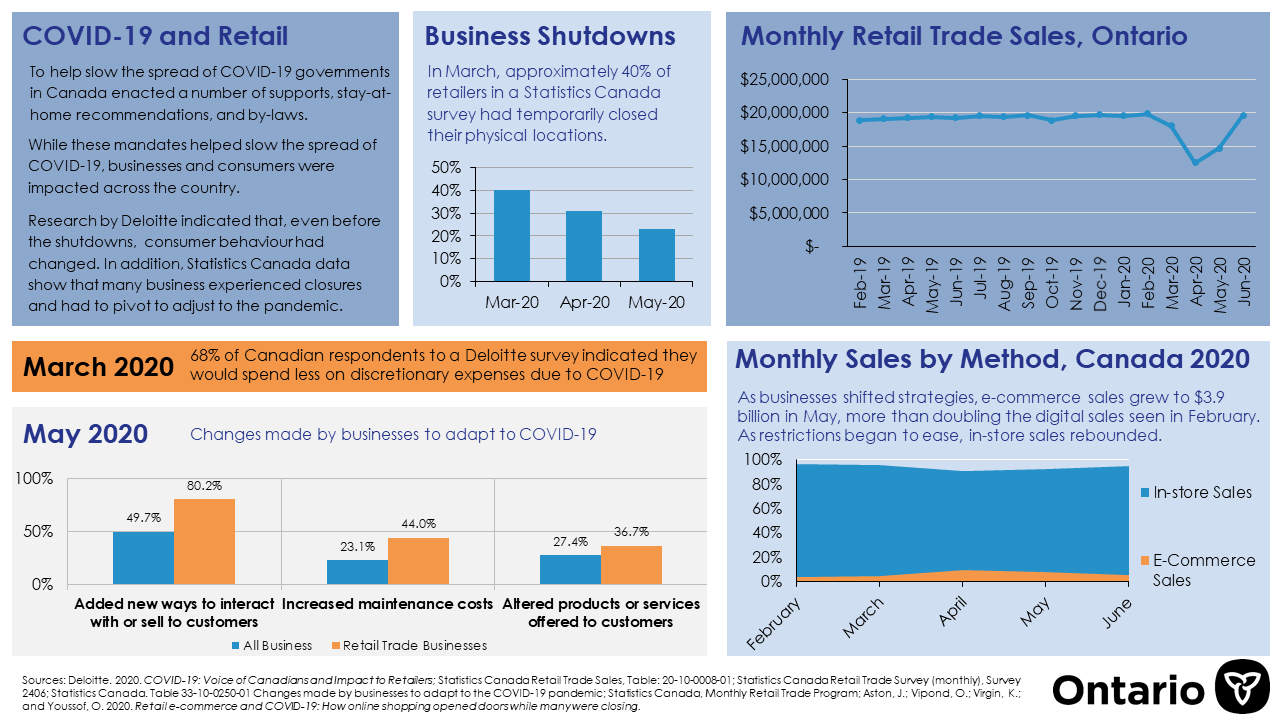
Vital updates:
- Today, the Honourable Chrystia Freeland delivered the Fall Economic Update from the Government of Canada, with a short-term stimulus package valued at $70 billion to $100 billion over roughly three years. Highlights of the announcement, which represents a budgetary update short of a new government budget, include:
- The wage subsidy will be bumped back up to a maximum of 75% again, at least until March, and the program will be continued until June 2021.
- The new Highly Affected Sectors Credit Availability Program (HASCAP) will offer new credit for the tourism sector. Fully government-backed loans of up to $1 million will be granted to businesses that have lost revenue at below-market rates on repayment terms of up to ten years.
- A top-up of up to $500 million, on a cash basis, to Regional Development Agencies and the Community Futures Network of Canada, bringing total funding to over $2.0 billion in this fund. The government will earmark a minimum of 25 per cent of all the Fund’s resources to support local tourism businesses, representing $500 million in program support through June 2021. This is in addition to the new Highly Affected Sectors Credit Availability Program.
- An additional $20,000 top-up to the Canada Emergency Business Account (CEBA) program, of which $10,000 will be forgivable, bringing the total available under CEBA to $60,000. The deadline to apply for a CEBA loan has been extended to March 31, 2021.
- An extension of the current subsidy rates of the Canada Emergency Rent Subsidy for an additional three periods. This means a base subsidy rate of up to 65 per cent will be available on eligible expenses until March 13, 2021. With the 25 per cent Lockdown Support also being extended, businesses may be eligible for a subsidy of up to 90 per cent of their eligible expenses.
- $181 million will be spent to assist people working in the arts and entertainment.
- Financial support for more environmental projects including mass tree-planting, home retrofits for energy efficiency, and electric vehicle chargers.
- $1 billion for long-term care to be allocated through the provinces and territories.
- Temporary support of up to $1,200 per child aged under six for low- and middle-income families eligible for the Canada Child Benefit (CCB).
- $1.5 billion to facilitate lifting all long-term drinking water advisories in First Nations communities.
- A promised overhaul of the tax system to raise more revenue from digital giants such as Amazon, Netflix, Facebook, or AirBnB.
- Although the update noted a deficit projected to reach $381.6 billion by the end of March, no deficit reduction plan was forthcoming. Also notably absent were details of a national childcare program, which were promised for the upcoming spring budget. Further details are available at https://www.budget.gc.ca/fes-eea/2020/home-accueil-en.html.
- Tomorrow, the Honourable Mona Fortier, Canada’s Minister of Middle Class Prosperity and Associate Minister of Finance, will join the Ontario Chamber of Commerce from 9:00 am to 9:30 am for a discussion of the 2020 Fall Economic Statement. Registration is free.
- Yesterday, the Honourable Bill Blair, Minister of Public Safety and Emergency Preparedness, and the Honourable Patty Hajdu, Minister of Health, announced that Canada will extend the Mandatory Isolation Order and temporary travel restrictions for all travelers seeking entry into Canada from a country other than the US, until January 21, 2021. Travel restrictions for US citizens and foreign nationals arriving from the US remain in place until December 21, 2020 and may be extended at that time. In addition, the Government is amending its order and creating a framework for considering applications from high-performance amateur sport organizations seeking to hold International Single Sport Events. To be considered, applicants would need to include written commitments of ongoing support from provincial/territorial and local public health authorities and provincial/territorial governments, as well as a robust plan to protect public health and the health of participants. The Government of Canada reminds everyone experiencing symptoms of COVID-19, or who has recently come into close contact with someone infected with COVID-19, that they should continue to quarantine or isolate for 14 days.
- George Spezza has begun work at Niagara Region as the new Director of Economic Development. Spezza brings with him more than 20 years of experience in the economic development sector, and in his new role will be responsible for leading Niagara Region’s Economic Development team. The team promotes Niagara on a global scale and works in partnership with the region’s 12 local area municipalities.
- The Council of the Corporation of the Town of Lincoln has given notice that it has commenced discussions to adopt the 2021 Budget for the Town of Lincoln and its associated Boards and Committees. As part of the budget review process, Council will consider the 2021 Fees and Charges By-law and the establishment of the 2021 Water and Wastewater Rates, and a public meeting will be held on Wednesday, Dec. 2, at 6 p.m. This meeting is to be held electronically in accordance with section 238 of the Municipal Act. Any person wishing to make submissions to Council regarding the proposed 2021 Water/Wastewater Rates or Fees and Charges are invited to submit written comments to clerks@lincoln.ca no later than 9:00 a.m. on the Friday before the meeting. Council will meet to consider and adopt the 2021 User Fees and Charges the following day, at 6 p.m. Members of the public may observe the proceedings by accessing the live webcast on the Town’s YouTube Channel.
- The Town of Pelham 2021 Capital Budget is scheduled to be presented for Council approval at the December 7, 2020, meeting of Council at 5:30 p.m. To view this year’s budget schedule and previous year’s budgets and reports, visit: www.pelham.ca/budgets.
Reading recommendations:
- How much did Thanksgiving contribute to Covid-19 spread? It’s wait and see for now, Andrew Joseph, STAT
Thanksgiving is over, and public health officials’ persistent warnings that large celebrations and travel could douse accelerant on out-of-control Covid-19 spread have passed. But whether their warnings were heeded — and what kind of impact Americans’ decisions might have had — won’t be clear for a few weeks. It will take a few days for those who got infected to start feeling sick, to get tested, and to get their results back. It will be two weeks or so before people who get sick enough to need hospital care show up in emergency departments. And it could be another two weeks after that before the seriously ill die, and a bit longer before those deaths are recorded in official tallies.
- How can people working from home claim expenses? John Dujay, Canadian HR Reporter
Many companies in Canada have turned to the government for help weathering the pandemic and the often devastating effects from the business slowdown. But some remote employees can also take advantage of the situation, from a tax-wise perspective. Employees working from home may be able to deduct certain expenses while they remain remote and many employers are actively trying to help their workers do so.
If you are showing symptoms, contact your health care provider, call the Public Health Info-Line at 905-688-8248, or chat to Public Health online. For testing, call 905-378-4647 ext. 42819 (4-CV19) for information on test centres in Niagara and to book an appointment.
Previous updates can be accessed here.
The GNCC is here to support you. Contact us with any questions you have.






